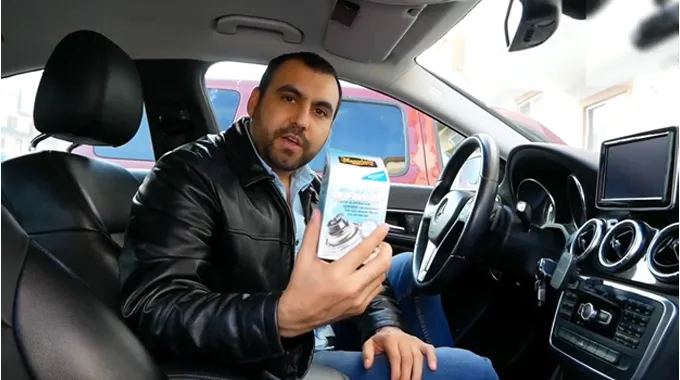Last Updated on April 13, 2023
Air fresheners are famous for making your car smell great, but are air car fresheners flammable? The fragrances can often be substantial and overpowering. Sadly, air fresheners have been linked to a few car fires.
Some car air fresheners are made from various flammable products, many of which are highly flammable. Most of them contain chemicals, including volatile organic compounds. These chemicals can ignite and cause a fire when exposed to the car’s engine heat or direct sunlight.
But the good news is that most car air fresheners are not flammable. So if you’re concerned about safety, it’s always best to check the label of your air freshener to make sure it is non-flammable.
Reasons Why are Car Air fresheners Flammable?
The fragrances in car air fresheners are usually made of flammable liquids like Volatile Organic Compounds (VOC), formaldehyde, aerosol propellants, benzene, and allergens. When released into the air as the freshener breaks down or sprayed, they can produce a strong smell that the human nose can detect.
These liquids can easily ignite by a spark, open flame, or excessive heat. The resulting fire can be pretty destructive, as the chemicals burn very quickly and generate a lot of heat. Also, the fumes from burning car air fresheners can harm human health.
Some car air fresheners are highly combustible because they contain alcohol. When the alcohol is exposed to a heat source, it ignites and causes a fire. The most common car air freshener is made with ethyl alcohol, which is highly flammable.
Other car air freshener ingredients, such as fragrances and essential oils, can also be flammable. Thus, car air fresheners must be used with caution and kept away from sources of heat. Be careful if you use an air freshener in your car, keep it away from heat sources, and don’t leave it on too long.
Flame Prevention Measures for Car Air Fresheners
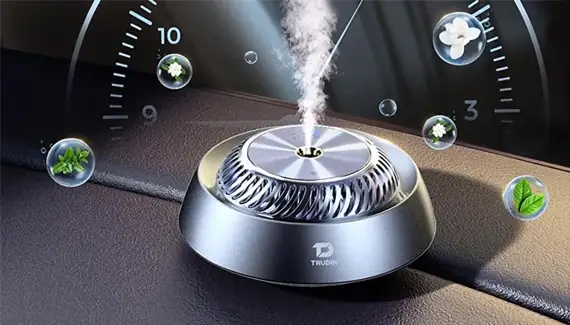
While car air fresheners can provide a much-needed boost of freshness to your vehicle, they can also pose a fire hazard if not used properly. Here are a few tips to help prevent fire when using air fresheners in your car:
- Only use air fresheners that are specifically designed for use in cars. Some home air fresheners can emit dangerous chemicals when heated, so it’s essential only to use safe products for car use.
- Make sure the air freshener is placed securely in an out-of-the-way location. It should not be placed near any heat sources, such as the engine or vents, and should not block your view of the road.
- Avoid hanging air fresheners from the rearview mirror. If they catch on fire, they could cause the driver to be distracted.
- Don’t place air fresheners near heat sources like the dashboard vents or heated seats. The heat can cause the fragrance to be released too quickly, resulting in a fire.
- Leave your car window open slightly when not using the car. This will help to ventilate the car and prevent the build-up of heat.
- Ensure the air freshener is placed in an area with good airflow. Doing so will dissipate the heat and prevent it from building up.
- Don’t leave the electric air freshener on for extended periods. If you’re going to be away from the car for more than a few minutes, turn it off.
Which Car Air Fresheners are Safe for Car Upholstery?
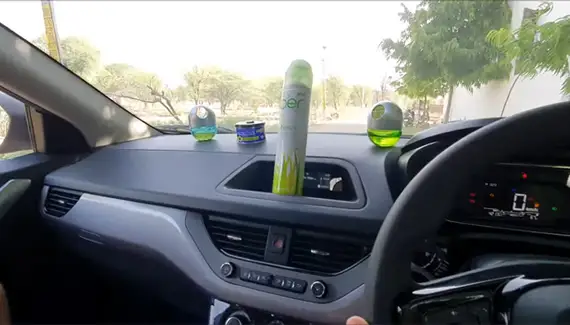
Car air fresheners come in many different forms, from scented oils and gels to paper and cardboard products. While many car air fresheners are safe, some can be flammable, posing a severe fire hazard. To stay safe, always choose air fresheners that are labeled as non-flammable.
Here’s a look at some of the most widely used car air fresheners and whether or not they’re safe to use:
1. Gel air fresheners: These air fresheners are often made with a gel base that contains essential oils. While they’re not flammable, they can be toxic if ingested, so remember to keep them out of reach of children and pets.
2. Liquid air fresheners: Liquid air fresheners usually come in a spray bottle and can be easily applied to carpets, upholstery, and other surfaces in your car. Yet, they can also be flammable, and you should read the labels carefully before using them.
3. Solid air fresheners: Solid air fresheners are usually made from a wax or resin base and often last longer than other types of air fresheners. They’re not flammable but can be messy if they melt or leak.
4. Plug-in air fresheners: Plug-in air fresheners are one of the most popular types of car air fresheners, but they can also be one of the most dangerous. The electrical cords can pose a serious fire hazard if improperly used, so it’s essential to read the instructions carefully before using them.
5. Natural air fresheners: To avoid synthetic fragrances and chemicals, there are several natural options, including essential oil diffusers. These diffusers use ultrasonic waves to disperse essential oils into the air, providing a safe and natural way to Freshening your car’s interior.
If you’re looking for an air freshener for your Jeep Wrangler or car, don’t worry, we’ve got you covered. To help you out, we reviewed some of the most popular air fresheners. So check out our post to find the best air freshener for Jeep Wrangler, so your ride smells clean and fresh for a long time.
Make sure to choose one specifically designed for automobiles and one that can withstand the ruggedness of off-road adventures.
Can Car Air Freshener Spray Canisters Explode?
Although car air freshener canisters are convenient for keeping your vehicle smelling fresh, there are some disadvantages associated with these products. In some cases, the canisters that contain them can explode, causing injuries and damage to your car.
The reason is that the aerosol cans are under a lot of pressure, and if they become damaged, that pressure can be released suddenly. This can happen if the can is dropped or exposed to extreme heat. It’s best to safely dispose of your damaged air freshener canister and replace it.
Car Air Freshener Canisters Explosion Prevention Measures

Anyone who has ever suffered through an air freshener canister explosion knows these happenings can be both messy and dangerous. Fortunately, you can do a few things to prevent your air freshener from exploding.
- Make sure that the air freshener canister is secured correctly in the vent. If it is not tight, the vibrations from the road can cause it to come loose and fall, potentially causing an explosion.
- Check the expiration date on the air freshener can. If it is expired, don’t use it. The toxic chemicals in the air freshener can break down over time and become unstable, leading to an explosion.
- Store the canisters at a cool, dry location. Extreme temperatures can also cause air freshener ingredients to break down and become unstable.
- Air fresheners should not be exposed to direct sunlight or excessive heat, which can cause the can to over pressurize and explode.
- Don’t puncture or damage the air freshener canisters, which can also lead to an explosion.
- Follow the car air freshener instructions carefully, and don’t use more than the recommended amount.
Is it Safe to Store Aerosol Spray Car Air Freshener in a Car?
Most car air fresheners are made with volatile chemicals that can evaporate quickly at high temperatures. For this reason, it’s generally not considered safe to store aerosol air fresheners in a car. The heat from the sun can cause the chemicals to release into the air, and inhaling them can harm your health.
Also, the chemicals can contribute to ozone depletion and smog formation. If you want to use an aerosol air freshener, it’s best to store it in a cool, dark place, such as the glove compartment or trunk. This will help to keep the chemicals from evaporating and reduce the risk of exposure.
Can You Leave Spray Air Fresheners in a Hot Car?
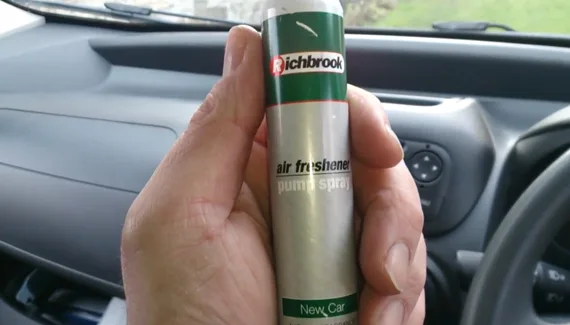
As the weather heats up, many of us are reaching for our trusty air fresheners to keep our cars smelling fresh and clean. Would spray air fresheners damage if left in a hot car?
The truth is that leaving any air freshener in a hot car is not recommended. High temperatures can cause the chemicals in air fresheners to break down and release harmful fumes. Also, heat can cause the canister to explode, making it a serious safety hazard.
If you must apply an air freshener to your car, remove it when you park in direct sunlight or in a hot environment. Store your air freshener in a cool, dry place for best results.
Is it Safe to Leave Electric Car Air Fresheners Plugged in?
Keeping your car smelling fresh and welcoming is easy with electric car air fresheners. When they remain plugged in when they are not in use, the car’s interior may smell fresh, but some people are worried about how safe it is to leave them plugged in.
Some air fresheners are designed to be plugged into the cigarette lighter socket, while others use batteries. To use an air freshener, plug it into a cigarette lighter, and remember to unplug it when not in use. This is because the socket can become hot and cause a fire.
If you use an air freshener that runs on batteries, it is generally safe to leave it to turn on. Just check the batteries regularly to ensure they are still working. But it is always a good idea to unplug any electrical device when you are not using it, just to be on the safe side.
The Hazards of Chemical Car Air Fresheners
Although car air fresheners may make your car smell nice, chemical air fresheners can be dangerous. When these products evaporate, volatile organic compounds are released into the air. VOCs have been linked to various health problems, including headaches, dizziness, and respiratory issues.
In some cases, VOCs can also lead to asthma attacks. In addition, many air fresheners contain phthalates, which are known to disrupt hormones and potentially cause reproductive damage.
Most car air fresheners contain synthetic chemicals that can pose a real health risk. These chemicals, such as petroleum derivatives, can increase your cancer risk. Others, like phthalates, cause congenital disabilities.
Can Car Air Fresheners Melt Car Plastic?
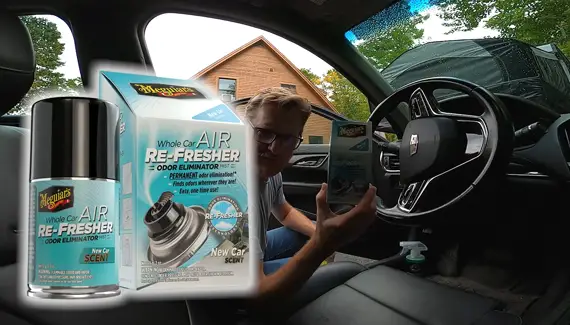
Many air fresheners contain essential oils that can help to break down plastic over time as they evaporate. This process is known as “plastic degradation,” which can eventually form small holes and cracks in car plastic. It’s also possible that essential oils in car air fresheners could warp or melt plastic surfaces.
Plus, air freshener chemicals can interact with the plastic, causing it to warp or melt. In extreme cases, this can even lead to fires. Worrying about air fresheners is unnecessary, as long as they are used sparingly and kept away from plastic surfaces.
How Do I Make My Car Smell Good Without Car Air Fresheners?
Most car air fresheners rely on harsh chemicals to mask bad smells, but there are a few natural alternatives that can leave your car smelling fresh and clean. One easy way to combat foul odors is simply cleaning your upholstery regularly. By doing this, you’ll be able to remove any dirt or debris that may be causing the problem.
You can place a container of charcoal in your car. The charcoal will absorb unwanted smells, leaving the air fresh. Keeping an open container of baking soda in your car is possible as well. This will neutralize odors rather than masking them.
A bowl of vinegar can be left in the car overnight or for a few hours. It will absorb bad smells, leaving your car smelling fresh. Keep your vehicle clean and free of garbage. A clean car is better than one cluttered and dirty.
Also, there are a few DIY options you can try. A straightforward way is to make your vent clip. Start by combining a few drops of essential scented oil with water in a small bowl. Then, dip a cotton ball into the mixture and place it on a clothespin. Allow the cotton ball to diffuse the scent throughout the cabin after it has been saturated.
